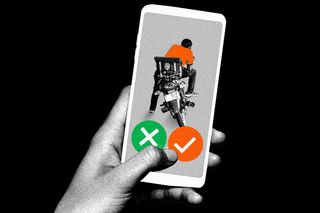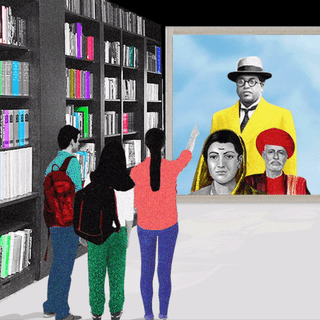
Muslim Gig Workers Are Beginning to Face Bigotry on the Job — And Nobody Is Helping
Platforms can protect workers — instead, they’re complicit through inaction.

At 8:30pm, 11th October, Ahmed*, a Muslim Swiggy worker in Ahmedabad called a customer when he’d arrived with his order. It was a brief exchange: “What is your name?” the customer asked. Ahmed let him know. “I’ve canceled the order,” the customer responded.
Prior to this exchange, the customer had entered the following delivery instructions through the Swiggy app: “Please only allow Hindu delivery person.”
Ahmed called Swiggy’s helpline for guidance, whereupon he was told to proceed to the customer’s location anyway. They’d cancel the customer’s order for him if he refused the food, Swiggy said. But the customer got there ahead of them – leading to a deduction of Rs. 5 from Ahmed’s already meager delivery fee of Rs. 31.
Nothing happened after that.
“They didn’t offer any guidance on how to handle the situation, they just said that they would cancel the order. They should support me right?” Ahmed stresses.
Shaikh Salauddin, president of the Telangana Gig and Platform Workers Union, says that this isn’t the first time such incidents have taken place; nor is it likely to be the last. Last month, a Swiggy delivery worker in Hyderabad received a similar delivery instruction: “Don’t want a Muslim delivery person.” Mahua Moitra, a minister of Trinamool Congress, called for the app to blacklist the customer.
“Delivering food or groceries is our duty — we don’t see who is Hindu or Muslim while doing so. Everyone is equal… Nobody knows who the farmer is, who cooks the food in the kitchen. Then why target delivery workers?” he asks.
Salauddin maintains that Swiggy hasn’t taken action against customers in either of the incidents.
***
While these are instances of direct bigotry exercised through the apps, another incident speaks to how platform apps evade responsibility or liability when it comes to worker safety – even during life and death moments.
A month ago, Saleem*, a Muslim Uber driver in Hyderabad was on his way to pick up a customer at 3:45 AM when a group of men stopped him. They smashed his windows and, after a few minutes, began to attack him through the broken windows. By that point, he was 15 kilometers away from his own home.
“They told me to say ‘Jai Shri Ram,’ and even chanted it while they hit me,” he said. Saleem drove off with the men in pursuit, until he came upon a dead end. “I left the car behind and ran. Meanwhile, they destroyed the car using large rocks… I kept a tasbih in my car – they knew my [Muslim] identity because of that.”
Saleem says the police arrived an hour and 10 minutes later. As he waited, he called Uber’s emergency number not once, not twice – but 45 times. Nobody answered his calls.
“There’s been no response till date. I could have been killed that day… it hardly takes two minutes. There were 6 of them and one of me,” he said.
Saleem’s car, which belongs to his cousin, remains destroyed, and the expenses to fix it remain steep – one lakh, sixty thousand rupees. The repair isn’t covered by insurance. “[Uber] doesn’t care if the driver lives or dies – they only care about their commission. I would have died that night, and nobody answered my calls.”
***
The problem begins with the fact that platform apps are legally not liable to protect their workers. And thus, protections for gig workers remain abysmally low. Moreover, even the few protections on hand are restricted to labor rights issues. But the incidents point to a new form of worker vulnerability that conversations about gig work haven’t yet caught up with: bigotry and safety from violence. Both incidents on Swiggy and Uber took place while workers were on the job and logged into the platform to complete a service. But in both instances, neither platform felt any responsibility toward the workers’ safety. There are several ways platforms can make working conditions safer and protected from discrimination, but it all boils down to how there’s no incentive to do so.
Related on The Swaddle:
Gig and Delivery Workers Approach Supreme Court Seeking Social Security
“It’s not rocket science. You can filter out specific words… they can make sure that words like Hindu, Muslim, Dalit are flagged. There’s no will to do any of this,” says Kaveri Medappa, a researcher on gig and platform labor. “Even if you don’t have these filters – as soon as the delivery person receives the delivery notes and is able to see them, why can’t [the platform] enable a function to report the notes and cancel the order? These are simple tools to have embedded in the app interface.”
But the absence of these tools speaks to a larger culture of indifference and entitlement to servitude that the apps explicitly cater to. The business model of Swiggy, Uber, and other platform apps revolves around customer convenience. This is fundamentally antithetical to workers’ labor rights. The way the apps have been designed and marketed make them seem like value-neutral entities that are constantly improving customers’ lives. But there are deeper political questions embedded into them: namely, who gets to be a customer, and how much control they can exert over workers. Here, identity becomes a critical question.
“The priorities that inform the design of these food delivery and transportation apps are profit maximization, customer satisfaction, efficiency – these are not innocuous nor inevitable. They comprise a limited set of political values that serve some by disadvantaging others,” says Srujana Katta, an ethnographer of platform labor. “They are not exercising any of their extensive power when it comes to incidents of bigotry and harassment perpetrated by users that they allowed onto their platforms – and they continue to allow to use their platforms.”
Related on The Swaddle:
In the Gig Economy, Customers are Complicit in Labor Exploitation
Through their inaction and indifference, apps compromise the workers’ right to life, the right to livelihood, and the right to dignity. “These apps are antithetical to people’s fundamental rights. There is no check by the state to reign in the powers of these apps,” Medappa adds.
Ahmed is hesitant to lodge a complaint with the police. “I am alone – I could do it if I had someone else to file it with me,” he says. He continues to use Swiggy as a matter of necessity.
“It’s very easy [for platforms] to empower workers to say ‘if you [customers] treat me like this, I won’t bring you your food,’” says Medappa.
But this goes against the value system of platform apps – creating a service class beholden to the whims of a consumer class. Within this system, the latter is entitled to openly discriminate against the former with no consequences.
That fundamental rights are openly violated – both directly and indirectly – through the platform apps shows how context matters when it comes to tech-based innovation. This is especially true for innovation that fundamentally reshape the economy in which we live. That context today is “characterized by deprivations, inequities, and polarization,” as Katta puts it. “In both these incidents, putatively “neutral” technologies – in being used by people living in a country that is increasingly riven by communal tensions – have become the stages upon which bigotry is enacted,” she adds.
The state rarely – if ever – steps in to redress the rights violations on platform apps, despite there being many strikes and union organizing around the same. The only time when any larger conversation has taken place, as Medappa points out, is when customers are hurt. This is evident in the recent Karnataka ban on Ola, Uber, and Rapido autos, prompted by customers complaining about the high fares.
***
In the United States, Uber banned white supremacists who made black Uber drivers uncomfortable and vulnerable. The same company in India, however, remains aloof in the face of Islamophobic violence that its drivers face while on the job. Saleem says he explained to Uber in detail what happened with him, but he was continuously met with vague, generic responses from the company with no concrete promises. “Uber’s representatives should have come with me to the police station. Instead, I’ve not heard a single word of support from them until now,” he says. Alone in the aftermath of violence, Saleem had to navigate a disbelieving police system and file his complaint without any support from the company.
Human beings aren’t value neutral, and neither are the things they create. The progenitors of the apps in India are all upper class, upper caste men. “The caste and class positions of the founders make it obvious how they’ve imagined the platforms – for well-off, upper class and caste customers to avail services at their doorsteps,” says Medappa.
All this makes bigotry a new feature of platform work – one that workers have little to no protections against. Currently, the buck seems to stop with nobody in particular: an errant customer being Islamophobic or a rare instance of religious violence at the behest of people unrelated to the apps don’t appear to make the apps themselves directly responsible.
Saleem has been out of work since the incident with the vigilante group. He lives with his wife, a homemaker, and his two children, 5 and 6 years old. He’s now unemployed and without Uber’s support – too afraid to step out looking for another job lest his attackers recognize him.
“Uber is run by its drivers. It’s their responsibility to keep us safe. As an international company, they have a big voice – but they haven’t stood up for us even once. If I had died, what would have happened to my family? Who would have provided for my children?” Uber has neither compensated Saleem for the damages incurred on the job, nor offered any support in pursuing the police complaint against the attackers.
“They haven’t called to see if I’m alive – and they would not have called if I had been dead.”
As Katta puts it: “Inaction is complicity.”
*Names changed to protect anonymity.
Rohitha Naraharisetty is a Senior Associate Editor at The Swaddle. She writes about the intersection of gender, caste, social movements, and pop culture. She can be found on Instagram at @rohitha_97 or on Twitter at @romimacaronii.
Related


How Community Education Collectives Are Challenging Existing and Increasing Educational Inequality
